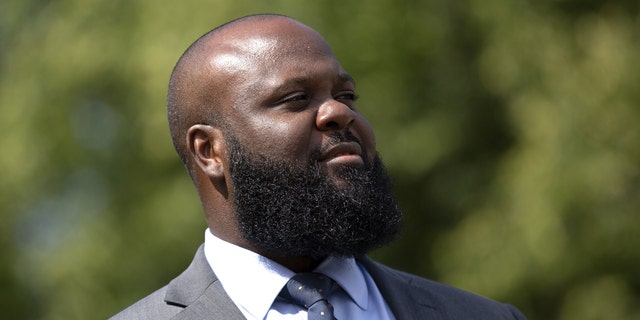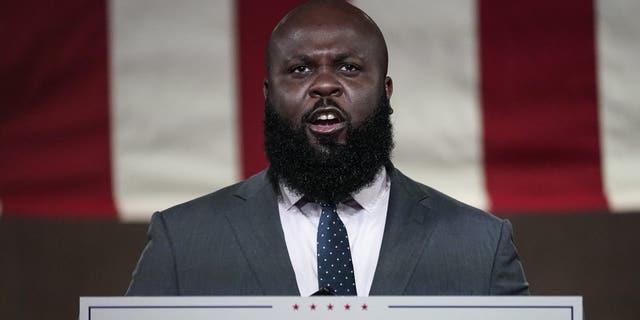Former Trump adviser Ja’Ron Smith launches public safety coalition to reduce violent crime
EXCLUSIVE: A former top adviser to President Donald Trump launched a public safety coalition Wednesday that is aimed at reducing violent crime in major cities and lower-socioeconomic communities across the country.
Ja’Ron Smith, who served as special assistant to the president for domestic policy, said he launched the coalition in partnership with center-right organizations and leaders to advance criminal justice reform without enacting soft-on-crime policies pushed by the Defund the Police movement.
“I’ve traveled through many communities that have been plagued by violence and crime,” Smith said in a statement. “No one in those communities want to defund the police. They want law enforcement to focus on preventing and solving violent crime.
“Our approach to addressing the current rise in violent crime is comprehensive – adequately fund law enforcement, build upon the smart-on crime reforms enacted during the Trump Administration, and forge partnerships between communities and law enforcement like we’ve seen in Dallas,” he said. “These are proven solutions.”
SIX MAJOR CITIES ON PACE TO PASS HISTORIC 2021 CRIME TOTALS HALFWAY THROUGH 2022
The coalition will adhere to four principles outlined in its “Statement of Principles on Violent Crime,” which was exclusively provided to Fox News Digital. The first principle is to “properly fund the police,” which includes “clear and transparent” budget appropriations so that police departments don’t have to rely on bringing in revenue through fines, fees, and forfeitures.
“By ‘defunding’ or making significant cuts to police budgets, law enforcement agencies will be limited in hiring more officers or keep current staffing levels, will likely have to reduce or eliminate certain training or continuing education programs, and will not be able to attract better candidates or maintain these officers due to lack of financial incentives,” the principle reads.
“We must fund law enforcement through means that do not distort their objectives because every minute they spend on revenue-generating activities is a minute they are not spending on solving or preventing serious crime,” it adds.
The coalition’s second principle is to “focus law enforcement time & resources on preventing and solving serious crime.” It argues that police officers are too often bogged down with non-criminal calls, traffic-related incidents, and mental health-related incidents that it prevents them from focusing their time and resources on combating violent crime.
“Instead, proper investment in services that would help treat people with these issues would significantly reduce the time, energy, and resources currently required of law enforcement while providing more successful alternatives that solve the root causes of many individuals’ criminal actions,” the principle says.

The coalition’s third principle is to “focus on evidence-based policies that reduce violent crime,” which promotes the practice of “focused deterrence,” targeting specific geographic locations and social networks combined with increased support services in those areas.
“The city of Dallas, Texas has recently implemented many of these strategies, including ‘hot spot’ policing, focused deterrence, ‘clean and green’ strategies, increased social services, and violence interrupters,” the principle states. “While most American cities saw increased rates of homicides in 2021, Dallas was able to decrease their homicide rate by 13% from 2020-2021. Additionally, arrests went down 11% during that time period; showing that focusing on the highest risk individuals, rather than strategies casting a wide net amounting to more arrests is a more effective route.”
The coalition’s fourth and final principle is to “continue to enact smart on crime policies that increase public safety and criminal justice system success,” which it says will limit unnecessary contact with the criminal justice system for people who pose little to no threat to public safety.
“For example, when a person is charged with a crime, their freedom prior to trial routinely rests on whether they have the means to pay financial bail, rather than their risk to society,” the principle states. “This allows those who are a public safety threat to buy their way out of jail, while low-risk defendants stay incarcerated prior to trial simply due to lack of ability to pay even a small amount of bail.”

“States should look to change their constitutions and statutes to provide judges greater discretion to detain pre-trial defendants who pose a serious threat to our communities,” it adds. “Additionally, courts should limit unnecessary pre-trial detention for those who pose little to no threat to public safety and simply cannot afford to pay bail.”
The statement of principles is meant to provide a “blueprint” for policymakers and law enforcement to reduce violent crime at the local level.
The statement has garnered more than a dozen signatories, including Lazaro “Larry” Cosme, the president of the Federal Law Enforcement Officers Association, Timothy Head, the executive director of the Faith and Freedom Coalition, Emily Seidel, the CEO of Americans for Prosperity, and Alice Johnson, the CEO of Taking Action for Good, whose prison sentence was commuted and eventually pardoned by Trump in August 2020.
Smith, who received the 20/20 Bipartisan Justice Award in 2017, was a key architect of the bipartisan First Step Act signed by Trump in 2018. Trump, who received the Bipartisan Justice Award in October 2019 for the First Step Act, thanked Smith for his involvement in the bill during his acceptance speech.
Read the full article Here


